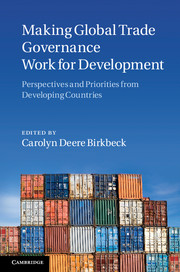 Making Global Trade Governance Work for Development
Making Global Trade Governance Work for Development Book contents
- Frontmatter
- Contents
- Figures
- Tables and boxes
- Contributors
- Acknowledgements
- Introduction
- Part I Global trade governance
- Part II Roles and responsibilities in global trade governance: diversity in developing country priorities and strategies
- Part III Strengthening multilateralism
- 10 The WTO, democracy and development: a view from the South
- 11 Reclaiming development in the world trading system (revisited): proposals for reform of WTO governance
- 12 Fostering developing country engagement in the WTO dispute settlement system
- 13 Rethinking the governance of Aid for Trade
- 14 Strengthening WTO surveillance
- 15 Why not an ombudsperson at the WTO? A proposal for debate
- Part IV Making WTO negotiations and decision-making processes fairer
- Part V Conclusion
- Index
- References
10 - The WTO, democracy and development: a view from the South
from Part III - Strengthening multilateralism
Published online by Cambridge University Press: 07 September 2011
- Frontmatter
- Contents
- Figures
- Tables and boxes
- Contributors
- Acknowledgements
- Introduction
- Part I Global trade governance
- Part II Roles and responsibilities in global trade governance: diversity in developing country priorities and strategies
- Part III Strengthening multilateralism
- 10 The WTO, democracy and development: a view from the South
- 11 Reclaiming development in the world trading system (revisited): proposals for reform of WTO governance
- 12 Fostering developing country engagement in the WTO dispute settlement system
- 13 Rethinking the governance of Aid for Trade
- 14 Strengthening WTO surveillance
- 15 Why not an ombudsperson at the WTO? A proposal for debate
- Part IV Making WTO negotiations and decision-making processes fairer
- Part V Conclusion
- Index
- References
Summary
The World Trade Organization (WTO) as an institution is the subject of critique from diverse perspectives. Thus, on the issue of democracy, mainstream international relations thinkers such as Joseph Nye are concerned with the democracy deficit that characterizes the WTO as an advocate of cosmopolitan democracy (Esty 2002: 7–22; Nye et al. 2003: 437–73). States are as unhappy with the WTO as non-governmental organizations are in terms of both process and outcome. Even the corporate actor, often seen as the driving force behind WTO agreements, is not fully satisfied with the architecture of the WTO for, inter alia, it is denied direct access to WTO fora, in particular its dispute settlement system. A principal reason why nearly every actor is unhappy with the WTO is that it covers so much ground, and has put in place such a complex and legalized institutional structure, that it cannot but leave all actors dissatisfied in one way or another.
With every actor unhappy, it would appear that the WTO is the work of a transcendental force. Far from it – the creation of the WTO, its rules and organization, is the work of powerful social forces and States. It has emerged as a key institution to sustain the global capitalist order to the advantage of an emerging transnational capitalist class (TCC) whose interests are articulated by powerful States. To put it differently, the fact that all actors have grievances does not mean that all grievances are of equal weight and concern. It is therefore necessary to sift the grievances in terms of both process and outcome to determine the global population that is seriously hurt by the operation of the WTO and what can be done in terms of reform of the WTO rules, identifying the assistance needed from the international community, and outlining the role national parliaments and social movements must play to realize set goals. Such an exercise in social audit would allow the prioritization of reforms that should visit the WTO.
- Type
- Chapter
- Information
- Making Global Trade Governance Work for DevelopmentPerspectives and Priorities from Developing Countries, pp. 261 - 300Publisher: Cambridge University PressPrint publication year: 2011
References
- 1
- Cited by


